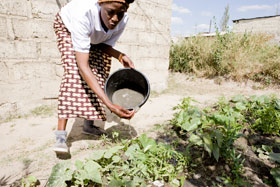
Nutrition
AED (now FHI 360) has a long history of introducing innovative approaches to address malnutrition, including engaging the food industry as a key player in this effort. AED has partnered with companies such as Dr. Reddy's, Unilever, Kraft, Coca-Cola, PepsiCo, and BASF to introduce and build demand for high-quality fortified food products. We work with these and other partners on the full spectrum of product development, including:
- Market research
- Supplementary food formulation and testing
- Behavior change campaigns
- Technology transfer
- Efforts to build enabling regulatory environments
 Product
development research
Product
development research
Our product-development research ranges from product acceptability studies to evaluations of the clinical effectiveness of therapeutic foods.
AED has worked extensively with Valid Nutrition, to develop nutritious and affordable alternative ready-to-use therapeutic food (RUTF) formulations. These products have been tested for nutritional content, quality, and safety. AED transferred RUTF technology to local manufacturers in Ethiopia, Malawi, and Zambia to rehabilitate malnourished children. Under the FANTA Project, AED (now FHI 360) serves as a technical resource in the development of supplementary and therapeutic foods, as well as in advising on effective systems for their distribution.
AED has also worked with Athena Foods and Nutriset's Plumpyfield Network in Ghana to customize a ready-to-use lipid-based nutrition supplement for children under two years old. We helped conduct product tests and market feasibility studies, build local manufacturing capability, and bring the product to market.
Building markets for fortified food products
FHI 360 (formerly AED) works with local producers to develop and expand markets for affordable, high-quality fortified food products targeted at vulnerable populations.
We brought together Procter & Gamble, Café Soluble, a local manufacturer, and the Government of Nicaragua to introduce a fortified drink for pregnant women and schoolchildren. AED contributed market research, demand-creation activities, and efforts to improve the regulatory and tax environment.
Through the Alive & Thrive Project we work with public and private partners to improve feeding practices for infants and young children in Vietnam, Bangladesh, and Ethiopia by increasing the availability of low-cost fortified foods, and promoting them through demand-generation campaigns.
The A2Z Project works with the food industry and national governments to fortify staple foods such as salt, flour, and oil with critical missing micronutrients such as iron, folate, zinc, and vitamin A. To date, AED has helped draft provisional standards for the fortification of salt, oil, sugar, maize, and wheat flour, and has provided assistance for quality control and testing systems in East, Central, and Southern Africa.
Addressing the nutritional needs of vulnerable groups
In Kenya, the Speak for the Child Project helped food manufacturer, Proctor & Allan, purchase the food supplement Unimix and develop community-based distribution channels as a way to reach vulnerable children. Also, in Kenya, the Kenya Nutrition and HIV Program, the National AIDS/STD Control Programme, and Insta Products introduced the first locally manufactured RUTF and expand its availability to 30 percent of health facilities. FHI 360 trains community-based organizations, governments, and the private sector to execute all aspects of this food for prescription program.
Influencing policy through research and tools
Through its policy and advocacy work, FHI 360 helps create enabling environments to increase the availability and use of fortified foods. The A2Z Project developed a food fortification formulator that approximates the potential impact, cost, and criteria for enforcement of food fortification programs. AED is also the creator of the PROFILES process for nutrition policy analysis and advocacy used in more than 20 countries to calculate the costs of poor nutrition, and the potential benefits gained from nutrition programs.
We would like to offer our expertise to your organization. If you would like to work with CPSHI or learn more about the expertise of our staff, please contact pshi@fhi360.org.
Download the Nutrition fact sheet (PDF, 549kb)